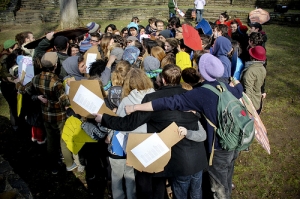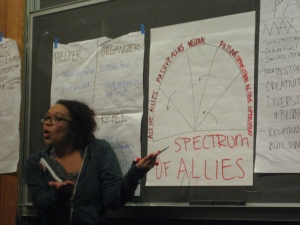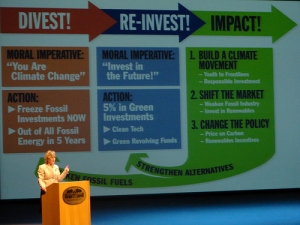2nd Annual Fossil Fuel Divestment Convergence
April 4th - 6th, 2014, San Francisco State University
Coordinated by: Fossil Fuel Divestment Student Network & California Student Sustainability Coalition
In consultation with: Responsible Endowments Coalition, As you Sow, 350.org, and Energy Action Coalition
Register Today!
If you have registered for the convergence, but haven’t paid your registration fee, please do so here. Registration fees are on a sliding scale, from $10-$150. Nobody will be turned away for lack of funds.
If you are able, please pay at least $50, because your registration fee will provide funds for other students to travel to the convergence!
From April 4th to 6th, 300 students from over 75 colleges and universities from across the United States and Canada will gather at San Francisco State University for the 2nd annual student-led Fossil Fuel Divestment Convergence. In February 2013, 150 students gathered at Swarthmore College to discuss and strategize about the role of the campus fossil fuel divestment movement in moving forward for climate justice. Out of that convergence, students created the Fossil Fuel Divestment Student Network-a national body in which students strategize, coordinate and build power together, and collaborate with grassroots organizations. In addition, numerous regional networks were created or strengthened out of the gathering.
This year’s convergence on the west coast will be an important step in strengthening the power of students through national and regional networks, while also growing the network’s geographic and institutional reach across public and private schools across the nation. While 9 campuses have committed to full or partial fossil fuel divestment, including the hosts at SFSU, many college administrations have largely been resistant to taking a stand against the fossil fuel industry. In 2013, over a dozen schools received an official “no” from their administrations. Though far from giving up, students stand strong in the face of administrative resistance. Students have already taken first steps towards escalation by coalition-building and direct action, gaining attention nationwide with sit-ins, petitions, rallies, public art displays, referenda, and growing alumni and faculty support. However, it’s time for students to reorganize themselves.
At one year old, this is a crucial moment for the divestment movement; it has the potential to regain the explosive momentum that drove it in 2013 by coordinating student efforts to spark a coordinated wave of bold escalated action. This convergence is designed to be that spark; In order to confront the overwhelming crisis of climate change, we must not only build our organizing skills and leadership, but also build relationships and coalitions with others fighting the same forces; all of which is part of the founding principles of the convergence. Fossil fuel divestment is just one piece of taking on the fossil fuel industry, and will ground our conversations in the role of the divestment movement in the larger Climate Justice movement. and private schools across the nation. While 9 campuses have committed to full or partial fossil fuel divestment, including the hosts at SFSU, many college administrations have largely been resistant to taking a stand against the fossil fuel industry. In 2013, over a dozen schools received an official “no” from their administrations. Though far from giving up, students stand strong in the face of administrative resistance. Students have already taken first steps towards escalation by coalition-building and direct action, gaining attention nationwide with sit-ins, petitions, rallies, public art displays, referenda, and growing alumni and faculty support. However, it’s time for students to reorganize themselves.
Why the convergence?
Mentorship and Training: Preparing Students for the Long Haul
The Fossil Fuel Divestment Student Network is setting up infrastructure for peer-to-peer mentorship within the divestment movement. Students can learn from each other’s stories and skills in building power on campus, working with university administrations, collaborating with local grassroots organizations, and escalating to win on divestment. Not only will this lead to a longer-lasting divestment movement, but it will also train leaders who will continue to organize after graduating. We need a mass movement in order to confront the climate crisis, and developing leaders is essential in getting there.
Strategy and Escalation:
While we have seen some phenomenal successes in the divestment movement over the past year, it is also clear that we need to start escalating and putting pressure on our administrations and boards in order to win on divestment. Escalating strategically is a carefully cultivated skill that can be honed through workshops, mentorship, and sharing stories. The convergence will be a space for students to do just that. Campuses that have escalated will share their successes and their lessons learned, students will learn about creative direct actions they can take to put pressure on their boards and win on-campus support, and will be connected long-term with other campuses who are looking to escalate.
Reinvestment and the Just Transition:
In order to us to truly confront the climate crisis, we need to not only be confronting the fossil fuel industry, but also building up community-owned alternatives to a fossil fuel-based economy. At this year’s convergence, we will be connecting students with community organizers who are not only working to confront the fossil fuel industry in their own community, but also to transition to a local, sustainable, and just economy that empowers and employs members of their community. As students push for divestment, they also have the opportunity to work with other groups fighting for a Just Transition - by volunteering with grassroots organizations, but learning about social justice as it relates to the environment, and in some cases, by pushing for community reinvestment in local renewable projects. Not only does this sort of collaboration support essential transition work, but also connects students, who are in a somewhat transient time, with work that has longevity and is grounded in long-term community-building.
Why are we seeking funding?
Successes from last year:
We organized last year’s convergence on a budget of under $25,000. The majority of the funding went to honoraria for speakers and trainers from under-funded grassroots organizations, as well as travel scholarships for students so that no one was barred from coming based on their financial situation. Students are able to make money stretch in creative ways - we are used to roughing it. Last year, students stayed on the floor of a church, we were fed by an activist cooking cooperative, and we used campus vans and other available resources to transport people. This year we are working to replicate this model, while doubling the number of attendees. We received overwhelming feedback from students and speakers that the convergence was a transformative experience that heightened their commitment to the struggle.
Supporting Underfunded Organizers:
As was the case last year, we are prioritizing bringing in organizers from grassroots and frontline organizations to share their struggles and build relationships with students. These are organizers that students do not often have access to through their relationships with paid organizers, but are none-the-less essential to learn from and build with. When we can provide honoraria to frontline organizers, we are not only assisting them financially to do the work they do, but are also bringing them into spaces that are not often accessible to them.
Supporting the Fossil Fuel Divestment Student Network:
The Fossil Fuel Divestment Student Network, a national body of students that came out of the first convergence, is working to build student power through fossil fuel divestment, to create peer-to-peer mentorships structures between campuses, and to provide a space for students to strategize and exchange ideas on a national level. The organization is entirely volunteer, and does not receive funding for organizers or events, which allows the organization to be dynamic and nimble, and to deftly respond to student needs. However, in order to further build up the student network and student leadership in the divestment movement, students need to be able to come together in person periodically.

